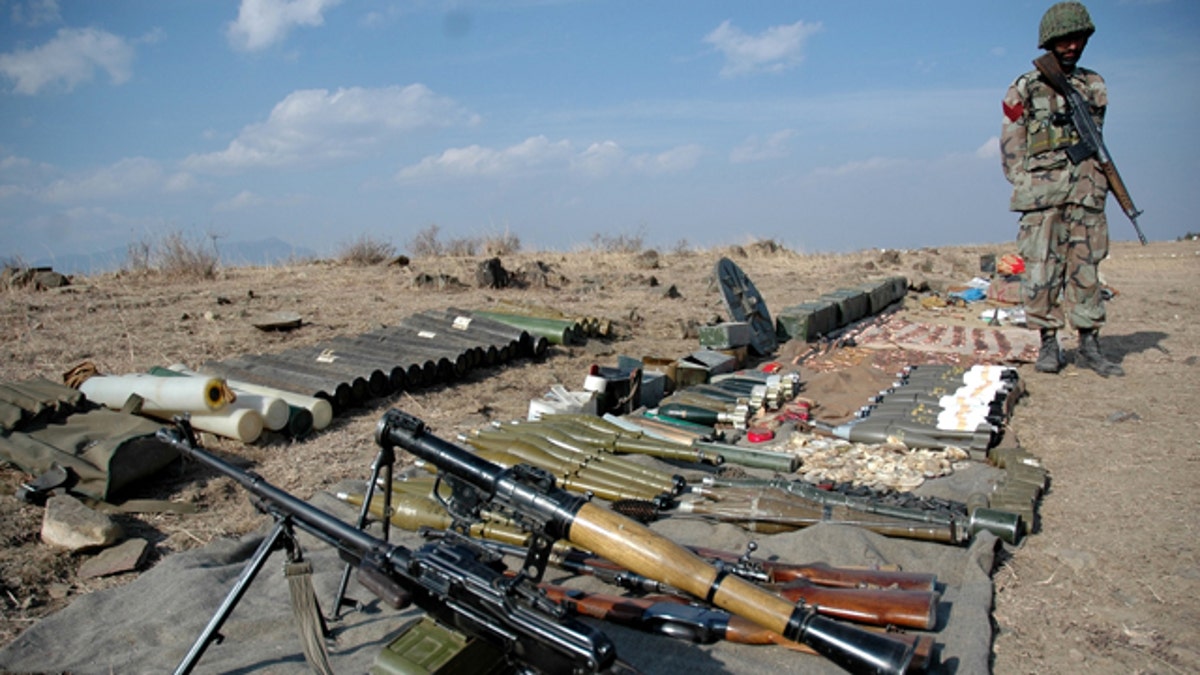
Pakistan army soldier stands next to ammunition seized from militants in Wana of Pakistani tribal region of Waziristan. (AP)
Top Pakistani military officials plan to conduct a major militant clearing operation next month similar to the 2009 Swat valley operation that purged one of the most Taliban-infested regions of Pakistan, U.S. military officials tell Fox News.
The news confirmed a Monday disclosure from Defense Secretary Leon Panetta, who said Pakistan had indicated its military was planning an operation against terrorists in a militant hotbed in the northwest. Now, U.S. military officials in Kabul and Washington say that Pakistan’s army chief Pervez Kayani recently told the top U.S. commander in Afghanistan, Gen. John Allen, that it would be a large-scale offensive designed to sweep the Waziristan tribal agencies.
[pullquote]
The officials, who have close knowledge of the meeting between Allen and Kayani, requested anonymity due to the fragile status of relations between the U.S. and Pakistan. They described the operation as similar to the clearing of Swat, in which Pakistan sent in thousands of troops for an 18-month rout of a mountain region where the military is still positioned today to prevent the Taliban from returning.
Such a tactical effort would have the potential to be a significant turning point in the tense relationship Washington has endured with what it describes as it’s most important ally in the war on terror, even though that ally has often been uncooperative in the face of U.S. demands that it tackle its growing militancy problem.
“We do not know at this stage if this indication of an operation has any substance to it,” said a U.S. military official in Kabul. “It may be lip service or it is perhaps an attempt to placate us as we continue to urge Pakistan to rout out militants and their safe havens within the tribal areas. The militants who hide there not only inflict casualties on Afghan citizens as well as Afghan and Coalition forces but they also are responsible for the deaths of tens of thousands of Pakistanis.”
It is also unclear if the operation would reach into the unruly region of North Waziristan, where some of the U.S.’s highest-value terrorist targets are based, or simply in South Waziristan, where the Pakistan military has been trying to rid the tribal agency of militants since mid-2009.
Pakistan’s operation would target Taliban fighters from both the Afghan and Pakistan factions, which separately aim to oust the Western-friendly governments of their respective countries, said a military official in Washington. It is unclear if the operation will hunt down elements of the Haqqani network, which is said by the US to support the remnants of original core of Al Qaeda who were behind the 9/11 attacks.
If based on the scope of the Swat valley campaign, Pakistan would be committing substantial resources of what it says is an overstretched military, which is split between fighting an insurgency across its northwest frontier and guarding its border with India to the south.
It would also be challenging for the military to wage an effective battle well beyond the fall. Waziristan's perilous mountainous terrain, where high altitudes and an early winter usually drive militants into caves and secure outposts until the spring.
The Pakistan military officially denied Monday that any pledge was made to Allen, a line consistent with rebuffs of rumors recently that it had finally agreed with the U.S. to pursue the Haqqanis.
The military has been forced to portray an image of resisting the U.S. amid intense, broadly supported anti-American sentiment stoked by rising influential Islamists who have not been contained by the authorities.
But following the killing of Usama Bin Laden by Navy SEALs, the Obama administration believes it may be in Pakistan’s strategic interest to conduct a significant operation against Waziristan’s terror groups. More than one year on, the military has still not been able to fully restore public confidence in its status as the de facto rulers of Pakistan who safeguard the country's interests. Moreover, they are also desperate to avoid another dramatic U.S. incursion into Pakistan, as it would embarrass the country even further and be an even deeper set back the military which appears uncertain on how to regain its reputation.
“It could allow the Pakistanis to say, ‘Look we do go after militants like you requested; we have caught this guy or wiped out this group,’" said an official in Washington.
“If they claim a high value target like a senior leader of a major terror group, it would also be their way of trying to redeem themselves on the world stage after the Bin Laden discovery, which they are desperate for people both domestically and internationally to forget.”
